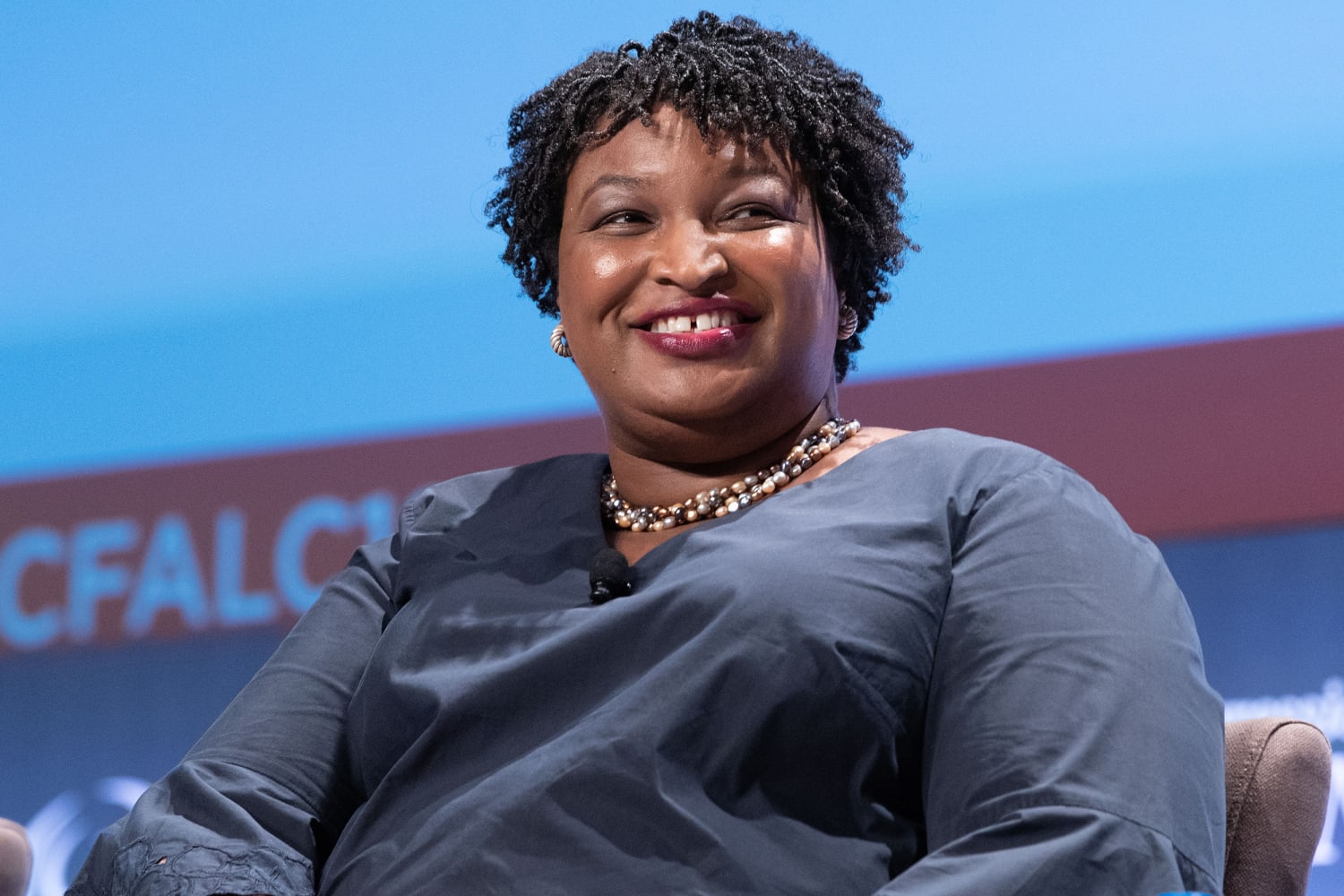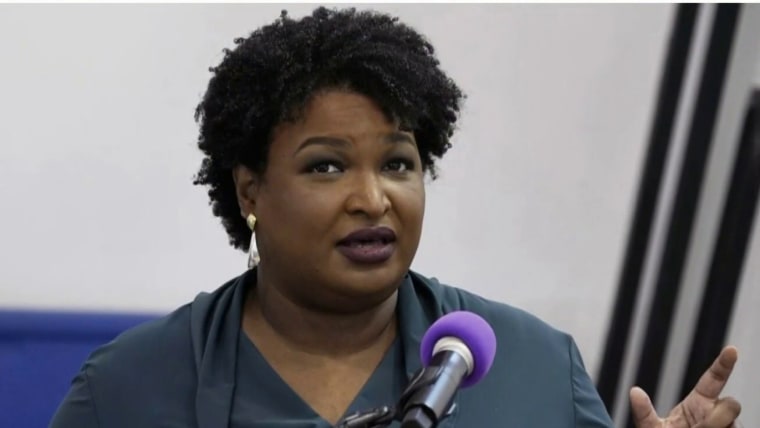WASHINGTON — As Stacey Abrams builds her second gubernatorial campaign in four years, she is looking at a Georgia electorate that is far larger, younger and less white than the one that handed her a narrow defeat four years ago, according to an analysis her aides provided exclusively to NBC News.
That’s one reason Abrams is confident that the result will be different this time, despite a national political wind that has shifted to Republicans’ backs following the election of Joe Biden to the presidency in 2020 and Democrats Jon Ossoff and Raphael Warnock to the Senate in January.
Nearly 1.3 million Georgians have registered to vote since her first bid in 2018. Forty-seven percent of them are people of color, 31.6 percent of them are Black and 43 percent of them are under the age of 30 — cohorts that traditionally skew heavily toward Democrats — according to the Abrams campaign’s analysis. Almost 250,000 of them have registered since the 2020 election.
And while voters don’t register by party in Georgia, the campaign’s modeling of available information on newer registrants estimates that 45 percent are likely Democratic voters and 28 percent are likely Republican voters, with the remaining 27 percent unclassified as yet because of a lack of available data.
“There is a clear trajectory that has been present for a decade that is continuing of who has registered since 2018 — who is eligible to vote for Stacey this time that was not on the rolls last time,” said Abrams campaign spokesman Seth Bringman.
The challenges facing Abrams are historic. She would be the first woman and first person of color to win Georgia’s governorship, and both the well-established historical trend and fresh electoral evidence suggest Democrats who win in the mid-terms will have to overcome a wind at Republicans’ backs.
Biden’s approval rating is upside-down at 42.3 percent in the Real Clear Politics average of polls, and Republicans made major gains in Virginia and New Jersey elections last month. But Abrams’ camp believes the shifts in those states, driven in part by white suburbanites, won’t be echoed in Georgia because the electorates are different.
The campaign’s analysis found that 52 percent of registered voters in Georgia suburbs are people of color, whereas the comparable demographics in Virginia and New Jersey are 25 percent and 17 percent, respectively.
That sets up a contest not just among the candidates, but between the trend in the state’s voting patterns — once a bastion of Republican strength, a streak of narrow Democratic wins fueled by Abrams’ registration and turnout efforts has demonstrated its competitiveness — and what appears to be significant momentum for Republicans nationally.
And yet some Republicans have reason to fear that former President Donald Trump’s entry into the fray — he has called for Republican Gov. Brian Kemp’s ouster and encouraged former Sen. David Perdue, R-Ga., to get in — could ravage the party’s chances of holding the governor’s seat.
“If that happens, it will be the biggest bloodletting Georgia has seen since Sherman took Atlanta,” University of Georgia political science professor Charles Bullock said, referring to Union Gen. William Sherman’s burning of the city in 1864.
Already, Kemp is facing a challenge from former State Rep. Vernon Jones, a onetime Democrat who switched to the GOP last year.
All sides say they expect the general election to be close, and the Cook Political Report, a respected electoral odds-maker, shifted the race from “leans Republican” to “tossup” when Abrams announced her bid Dec. 1.
Abrams lost to Kemp by 54,723 votes out of nearly 4 million cast in 2018. Kemp is caught in the thresher of Trump’s fury because he refused to intervene on Trump’s behalf when Georgia voters handed Biden their 16 electoral votes last year. It was a squeaker, decided by 11,779 of more than 4.9 million votes cast.
Trump’s pollsters surveyed a possible primary in August and found an opportunity for Trump to make a difference with an endorsement of Perdue.
“We found that Brian Kemp is a weak incumbent that could be very susceptible to a strong primary challenge,” pollsters for Trump’s SuperPAC wrote in a memo first reported by Politico, “Trump’s endorsement of David Perdue would completely upend the race.”
In September, Trump said at a rally in Perry, Ga. that he so disdains fellow Republican Kemp that it would be “OK” with him if Kemp loses to Abrams.
“Having her, I think, might be better than having your existing governor, if you want to know what I think,” Trump said at his rally. “Stacey, would you like to take his place? It’s OK with me.”
Trump allies, including FOX’s Sean Hannity and former House Speaker Newt Gingrich, R-Ga., have piled on, with Hannity calling on Kemp to drop out and Gingrich writing that Perdue is the only one who can unify the party. The Atlanta Journal-Constitution referred to Kemp’s predicament as an “epic political squeeze” between the pressure of Trump and Perdue in the primary and Abrams in a possible general election re-match.
Trump spokeswoman Liz Harrington did not reply to a text inquiring whether Trump has spoken directly to Perdue since Abrams announced her campaign.
Kemp can’t control whether Perdue jumps in. For now, he is running both on his conservative record as governor and against the national Democratic Party. In particular, he is planning to highlight more restrictive election-regulation and abortion measures he signed into law, his resistance to COVID lockdowns and his efforts to combat gang violence and human trafficking, according to campaign spokesman Cody Hall.
“Gov. Kemp is in the fight against Stacey Abrams, Joe Biden and their woke allies to keep Georgia the best place to live, work and raise their families,” Hall said. “We feel confident that his record of fighting for hard-working Georgians and his vision for the next four years will ensure victory next May and November.”
For Abrams, who is not expected to really ramp up her campaign until the new year, the potential chaos on the Republican side is a boon. Against the backdrop of a divided GOP, she plans to run in lockstep with Warnock, a longtime ally who is seeking re-election in what is expected to be one of the most closely contested Senate races in the country.
“We know that on our side we’re going to be moving in the same direction and there’s no disunity between any type of political heavyweights at the top of the ticket,” Bringman said.
Source: | This article originally belongs to Nbcnews.com











